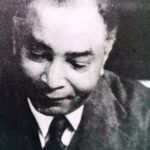DUNCAN, PATRICK BAKER
- 4 Min Read
Patrick Baker Duncan (June 1918 – June 4, 1967), born into the South African white liberal tradition, was unique in terms of his close association with black nationalist groups and leaders and his personal involvement in fighting the apartheid structure.

PHOTO CAPTION: Duncan, Patrick Baker. SOURCE: EA Library
Duncan was born in Johannesburg, schooled in Switzerland, in the Cape, and at Winchester in England, before attending Oxford. His father, Sir Patrick Duncan, was the governor general of South Africa prior to the Union, and he himself followed in British service, first as private secretary to the British High Commissioner to Basutoland (later Lesotho), and then in Basutoland government service, from 1941-52. Duncan left his Basutoland post in order to take a leadership role in the Defiance Campaign against racism in South Africa.
The campaign was co-sponsored by the African National Congress (ANC) and the South African Indian Congress. Duncan, an emotionally avid anti-Communist, joined this campaign to support his beliefs in black political rights but also to demonstrate that whites, other than Communists, stood with blacks in opposition to apartheid. As further proof of his commitment, Duncan, with other whites, entered a black location without permission, forcing a confrontation with the authorities and a subsequent jail sentence.
Duncan was well known to and well considered by black leaders of the time, sharing platforms with Albert Lutuli and Robert Sobukwe amongst others. Despite this role, Duncan was not allowed to join the ANC and turned his attention in 1955 to helping to found the Liberal Party, the only multi-racial political party in South Africa. He became the editor of Contact, a fortnightly paper published in Cape Town and espousing Liberal Party views. In 1958, Duncan, his wife, Cynthia, and Jordan Ngubane formed a Liberal Party delegation to the All-African Peoples’ Conference in Accra, which was a non-governmental gathering called by Kwame Nkrumah of Ghana to discuss the use of violence or nonviolence in liberation efforts in the remaining parts of colonial Africa. At that conference, Duncan kept in close touch with the Congress Alliance delegation led by the then-exiled South African journalist Ezekiel Mphahlele.
Duncan had worked as best he could toward equal political rights for black South Africans and against the institutionalisation of apartheid. In 1960, he printed a report of the South African Communist Party and was then ordered by the South African security police to divulge his sources.
This, although himself an anti-communist, he refused to do, on the grounds of journalistic responsibility to protect his sources. He was then jailed for three weeks. When, in 1961, he was banned along with several other Liberal Party leaders, he denounced in his bitterness the non-violent approach, resigning from the Liberal Party in 1963 on those grounds.
He then joined the Pan African Congress (PAC). He had already, in 1962, fled to Basutoland. Declared a prohibited immigrant there in 1963, he went briefly to London. As the most prominent white in the PAC structure, Duncan was bound to be controversial, and he was soon pushed into moving to Algeria, where he published a French-language newspaper for the PAC. He also contributed to occasional English and American newspapers as well as authoring his own book, South Africa’s Rule of Violence, in 1964. Duncan remained a PAC member until his death.
Liberal whites in South Africa, whose activities had often been viewed with some skepticism by blacks, were traditionally the upholders of existing black political rights (such as the franchise in the Cape) and the defenders of greater erosions of those rights. As history has shown, the liberal movement failed, but Patrick Duncan, despite his last years of bitter isolation and understandable frustration, stood out as a white, who, without other ideological motivations, would stand up for black rights.
STEVEN MCDONALD




